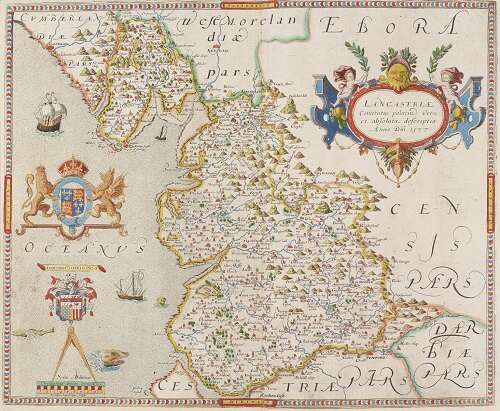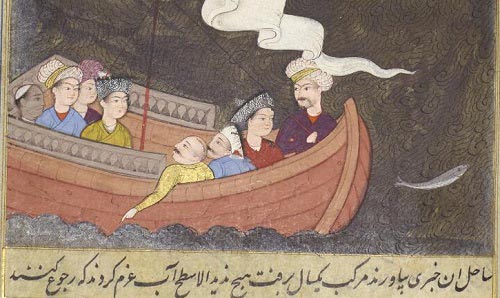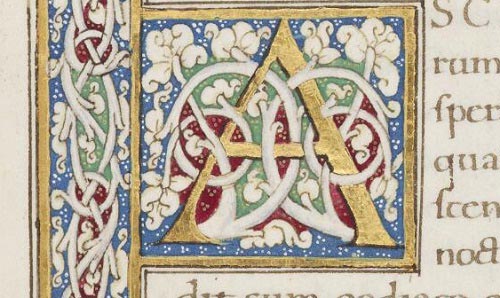
Local History and Genealogy Collections
The Library holds a wealth of printed, archival and visual material relating to local history and genealogy.

Widely acknowledged as the first industrial city, Manchester lies at the heart of our local history collections. Our holdings also encompass the historic counties of Lancashire and Cheshire, which incorporate modern-day Greater Manchester and Merseyside.
This overview focusses on resources for north-west England, but material with wider relevance to local history and genealogy is also noted. Offering an insight into the lives of ordinary people, these holdings are also important for social, political, economic and environmental history, and gender studies.
Manuscript resources
Dating from the 12th to the 20th centuries, the family, estate and charter collections include some of our earliest resources for local history and genealogy. They derive mainly from the north-west, especially Cheshire, but most English counties are represented. Combining administrative and legal records with personal documents such as marriage contracts, wills, diaries and private correspondence, these are important sources for the history of landed families. Estate records also offer insights into local politics, and the development of transport networks including canals and railways.
Our diverse collection of English manuscripts is worth exploring from a genealogical and local history perspective. Material relating to Lancashire and Cheshire includes family history notes and pedigrees, parish register transcriptions, and armorials. Lay subsidy rolls are held for the West Derby hundred of Lancashire (1585) and for Salford (1641). There are records by numerous local antiquaries including: Thomas Helsby, William Nicholls, George Henry Hankinson, Matthew Gregson, Thomas Raffles and Samuel Hibbert-Ware. The 18th-century manuscript travel journals of Dorothy Richardson, illustrated with numerous pen-and-ink drawings, include tours of Yorkshire, Lancashire, Derbyshire, Nottinghamshire, Oxford, Bath and London. The Peterloo Relief Fund Account Book lists the names and addresses of people who received payment for injuries received during the Peterloo Massacre (1819).
The Manchester Guardian Archive is a nationally important source for social and political history. The Manchester Men’s League for Women’s Suffrage Archive provides a local response to a national movement. Manchester’s social history is also reflected in the archives of Agecroft Rowing Club, Manchester Reform Club, and the charities Henshaw’s Society for Blind People, Wood Street Mission and the Manchester University Settlement. Collections concerning the economic and industrial history of the north-west include papers relating to the textile industry, engineering, pharmaceuticals, trade union associations and, more recently, computing.
Among the personal papers held by the Library are those of local journalists, academics, doctors, politicians and businessmen. Of particular interest to genealogists, the Manchester Medical Collection contains information on Manchester doctors from the early 19th century onwards, including biographies of over 6,000 local medical practitioners. For The University of Manchester, printed calendars from 1862 onwards contain lists of staff, graduates and students. Student details can also be found in the register of graduates, declaration books and students in residence lists. The Athletic Union records, which include membership lists, are a valuable source for the history of sport at the University.
Printed resources
The Library holds a wide range of English county histories published from the 16th century onwards, including volumes from the Victoria County History series (founded 1899). Key titles for the north-west include original and revised editions of Edward Baines’s History of Lancashire and George Ormerod’s History of the County Palatine and City of Chester. County histories often include information on the aristocracy and gentry. Burke’s Peerage and Burke’s Landed Gentry contain further information on established families.
The Library holds the publications of several local record and antiquarian societies. The Lancashire and Cheshire Antiquarian Society, the Chetham Society, and the Record Society of Lancashire and Cheshire, all founded in the 19th century, are still flourishing today. Published parish register series are available for many counties, including Lancashire. Our holdings of trade directories are moderate, but include six out of seven directories for Manchester published in the 18th century. Of note is a heavily annotated copy of the 1794 directory, with contemporary biographical observations by a Manchester surgeon, Robert Wagstaffe Killer. 19th- and 20th-century directories by publishers such as Kelly, Pigot and Slater provide sporadic coverage of English towns and counties. A collection of poll books dating from 1734 to 1868 is also available, with a large group from East Anglia.
Full runs of the radical newspaper, the Manchester Observer, (1818-1822) and the Cotton Factory Times, (1889-1937) a weekly newspaper for Lancashire cotton operatives, are among our most important regional periodical holdings.
Our local history monographs and pamphlets range from studies of individual businesses, societies and public buildings to broader histories of villages, towns and cities. Our Railway Collections, which have national coverage, document connections between localities. The vernacular speech of the north is captured in Lancashire dialect poetry and other writings by authors such as John Collier (‘Tim Bobbin’) and Edwin Waugh. Our Street Literature Collection contains single-sheet material including playbills, proclamations, and other public notices relating to daily life in the north-west and beyond. Printed ephemera held in manuscript collections includes placards and notices relating to Peterloo in the Wadsworth Manuscripts, and playbills in various performing arts archives.
Nonconformist collections
Our Methodist Collections contain material of national importance to the Church. However, a range of resources, dating from the 18th century to the present day, is available to support local and family history across a number of denominations. Our printed lists of ministers and lay people are complemented by personal papers, magazines and newspapers. Circuit plans are an important source of information about local/lay preachers, while trustees’ papers include names of active members of chapel congregations. Further details about Methodist ministers can be found in the records of theological colleges and in the Minutes of Conference. The Connexional Archives include wider information about the activities of the Methodist Church, including Property Division records, district minutes, and an extensive collection of printed local histories.
In our Christian Brethren Archive a key genealogical resource is the Echoes of Service Archive. This contains biographical material and correspondence relating to Brethren missionaries from the 1830s onwards. The Echoes of Service periodical, formerly The Missionary Echo, is available online from 1872 to 1960. This focusses on the missionaries’ work, but includes details about their personal and family lives. Missionary files (c.1910-2010) and newsletters (1958-2010) are also held for the Scottish missionary organisation Interlink (formerly Home & Foreign Missions).
Map collection
Ordnance Survey maps of Manchester dating from the 1800s to the present day are available at various scales. The level of detail in some large-scale maps extends to the interior layout of public buildings and the position of street furniture. Maps and plans by private surveyors such as William Green (1794) and Joseph Adshead (1851), capture the changing face of Manchester during the Industrial Revolution. Other plans document the area’s developing transport links, including the railway network and the Manchester Ship Canal.
Visual collections
Many of our printed monographs are illustrated, including views of local streets, public buildings, private residences, people and events. Scrapbooks and folders of images collected by local antiquaries are also available. Our holdings of 19th-century satirical prints include cartoons relating to general and parliamentary by-elections in Manchester and Salford in the 1870s.
Photographs of 19th-century Manchester are found in the collection of the architect and theatre-enthusiast, Alfred Darbyshire. The British Victorian Photography Collection includes an album of images of Manchester by Francis Frith & Co. There are a number of photo-books by Alvin Langdon Coburn who had close ties with the north-west. These include images relating to Manchester’s cotton industry, Manchester Ship Canal, Manchester Reform Club, and Liverpool. Social documentary photography around Manchester and the north-west region in the 1980s and 1990s can be found in our Photography Collection. Photographers include Martin Parr, Richard Davis and Mark Warner, whose work also includes portraits of luminaries from the Manchester music scene (c. 1980-2000).
Ahmed Iqbal Ullah RACE Centre
The Local Studies collection at the Ahmed Iqbal Ullah RACE Centre offers a growing collection of resources, including books, pamphlets and oral histories, produced by local community organisations and Manchester writers, which tell the story of Manchester’s global majority communities. The global majority includes communities whose roots are in Africa, Asia, the Middle East, Latin America or the Caribbean, and those that have experienced forced migration.
The archive collections offer an insight into the history of Manchester and Greater Manchester through the eyes of global majority communities. Examples include material relating to Manchester’s Caribbean Carnival, established in 1972, and the Manchester Ukrainian Community, including the Cheetham Hill area, from the 1950s to the present day. The Malik Bakh Archive documents the Everest Restaurant, an early Indian restaurant located in Whitworth Street. The Elouise Edwards Collection focusses on the work of the campaigner Elouise Edwards, who was instrumental in celebrating Black history and culture, battling racism, and developing vital community resources in Moss Side.
List of collections
Physical collections
- Agecroft Rowing Club Archive
- Malik Bakh Archive
- British Victorian Photography Collection
- Christian Brethren Archive
- Alvin Langdon Coburn Photography Collection
- County Histories
- Alfred Darbyshire Collection
- Richard Davis Photography Collection
- Echoes of Service Archive
- Elouise Edwards Collection
- English Manuscripts
- Guardian (formerly Manchester Guardian) Archive
- Henshaws (Henshaw’s Society for Blind People) Archive
- Hibbert-Ware Papers
- Manchester’s Caribbean Carnival Archive
- Manchester Medical Collection
- Manchester Men’s League for Women’s Suffrage Archive
- Manchester Reform Club Archive
- Manchester Ukrainian Community Archive
- Manchester Settlement Archive
- Martin Parr Photography Collection
- North West Printing Collection
- Peterloo Relief Fund Account Book
- Photography Collection
- Railway Collections
- Dorothy Richardson Papers
- Street Literature Collection
- University of Manchester Archives
- Wadsworth Manuscripts
- Mark Warner Photography Collection
- Wood Street Mission Archive
Digital collections
- Echoes of Service periodicals (1872 to 1960) in Library Digital Collections
- Mapping Manchester in Manchester Digital Collections
- Peterloo in Manchester Digital Collections
Further information
Related subject pages
- Ahmed Iqbal Ullah RACE Centre Collections
- Economic and Industrial History Collections
- Family, Estate and Charter Collections
- Methodist Archives and Research Collections
- Performing Arts Collections
- Social and Political History Collections
Other resources
- Methodist collections: Using the Connexional Archive.
- Online Map Collections: Old maps of Manchester.
- Maya Sharma and Joanne Robson, What do we mean by Oral Histories?
- Maya Sharma, Joanne Robson and Annie Dickinson, The Ahmed Iqbal Ullah RACE (Race Archives and Community Engagement) Centre
- Dorothy J. Clayton, ‘Sources for the History of North-West England in The John Rylands University Library of Manchester’, Bulletin of the John Rylands Library, 71.2 (1989), 181-204.
Rylands blog posts
- Anne Anderton, ‘Francis Frith, Manchester & the Business of Art’.
- Clare Baker, ‘New Collection Announcement: ‘Images of Hulme in the 80s and 90s’’. Photographs depicting Hulme; the people, buildings and landscape, taken by Richard Davis.
- Dan Eltringham, ‘A Travelling Life: Dorothy Richardson’s Eighteenth-Century Manuscript Travel Journals’.
- Janette Martin, ‘A Closer Look at the Manchester Observer (1819–1822)’.
- Janette Martin, ‘Made in Manchester: Introduction’.
- Janette Martin, ‘Peterloo: The Forgotten Massacre’.
- Julie Ramwell ‘Robert Wagstaffe Killer’.

Exploring subject areas
An overview of our Special Collections, including information about the background and history of our holdings.

Special Collections A-Z
Explore the Special Collections through the collection names and descriptions using our searchable A-Z tool.
